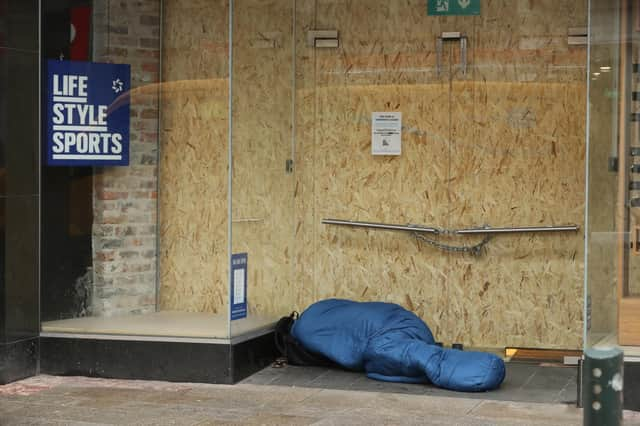At least one rough sleeper in St Helens


At least one person was sleeping rough in St Helens last autumn, figures suggest.
Charities have welcomed a drop in the number of people bedding down on the streets across England, but warned more must be done for the Government to reach its target of eradicating homelessness by 2024.
Advertisement
Hide AdAdvertisement
Hide AdMinistry of Housing, Communities and Local Government data shows there were between one and four rough sleepers in St Helens during a spot check one night between October and November last year.
There was at least one rough sleeper in 2020 and 11 in 2019, prior to the coronavirus pandemic.
Figures below five have been suppressed for the first time this year, to prevent the identification of individual people.
Across England, the number of rough sleepers fell from 2,690 in 2020 to 2,440 last year.
Advertisement
Hide AdAdvertisement
Hide AdIt also represented a 43% decrease compared to 2019, when 4,270 rough sleepers were recorded.
The significant decline followed the launch of the Government’s Everyone In scheme, which provided councils with additional funding to house homeless people during the pandemic.
Rough Sleeping and Housing Minister Eddie Hughes said: "The Government remains focused on ending rough sleeping by the end of this parliament and we’re making excellent progress towards this.
"These figures are testament to that, showing our investment is helping more people have a roof over their heads and the best possible chance of turning their lives around.”
Advertisement
Hide AdAdvertisement
Hide AdWhile rough sleeping has declined in recent years, the latest figure represents a 38% increase from the 1,770 rough sleepers counted in England in 2010, when records began.
In St Helens, there were between one and four rough sleepers in 2010.
The count includes people sleeping outside, but does not cover sofa surfers, those in hostels or shelters or people in recreational or traveller sites.
Osama Bhutta, director of campaigns at housing charity Shelter, said the figures "show the race to end rough sleeping has started but it’s far from over".
Advertisement
Hide AdAdvertisement
Hide AdHe added that the looming cost-of-living crisis and lack of suitable long-term homes means "we’re now at a fork in the road".
Mr Bhutta said the Government cannot meet its 2024 target without a "proper plan to tackle the root causes" and called on a roadmap to end homelessness.
The Department for Levelling Up, Housing and Communities says it is providing £2 billion over the next three years to end homelessness, including supplying 6,000 homes through the Rough Sleeping Accommodation Programme, and is committed to publishing its Rough Sleeping Strategy, though a timeframe has not been provided.
Matt Downie, chief executive of homelessness charity Crisis, said: "It’s very encouraging that there continues to be fewer people sleeping on our streets and that the numbers remain below pre-pandemic estimates – highlighting again that by prioritising ending homelessness we can make a difference, but we cannot be complacent."
"This must be backed up by a strategy to deliver the affordable housing we need," he added.